The Exeter City Football Club Museum: The Journey from a Cupboard to a Stadium-Wide Museum
05/12/2019 - 9.48
Gabriella Giannachi, Will Barrett, Paul Farley and Martin Weiler
In 2013, while researching the development of a platform to create digital trails with the Royal Albert Memorial Museum and Art Gallery at Exeter, Gabriella Giannachi and Will Barrett (Exeter University) entered into a partnership with Exeter City Football Club and the Supporters Trust, initially just to test the Time Trail platform and subsequently to catalogue an existing collection of heritage memorabilia located in a cupboard in the club’s head offices and in a storage space underneath a nearby staircase.
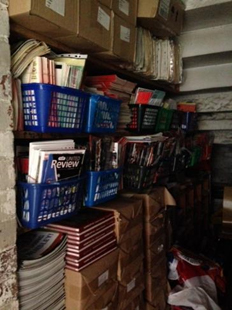
It soon became evident that the Trust and Club were keen on cataloguing and digitising some of their collection and, in collaboration with the Digital Humanities Lab at Exeter University, we created the Grecian Archive which uses Dublin Core archival software on an Omeka platform, hosted by the University to tell the history of the Club and Trust through a series of exhibits, a timeline, a map, and a wide range of collections, including an A/Z of all former players, managers, and other key figures from the Club’s history.
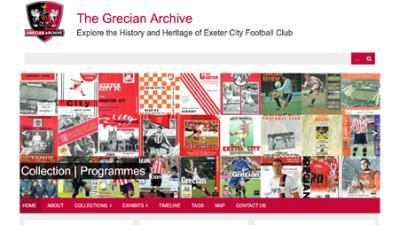
While we were using the heritage during a series of memory workshops with the Senior Red fans group at the Cub, we realised that the oral histories associated with the heritage were crucial to understand and enhance most of the tangible heritage, now found on the fast growing archive, as well as on display at the Club. These histories needed to be collected and utilised in order to broaden and enrich the historic narrative of the Football Club, its fans and the local community.
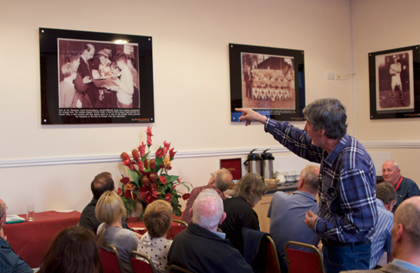
So, we started to document the Senior Reds’ memories systematically through a series of individual and thematic films, uncovering narratives related not only to the Football Club and events on the pitch, but also the cultural and social fabric of Exeter.
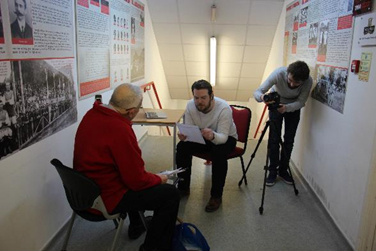
In 2016, we were awarded a Heritage Lottery Fund grant for ‘The History of St James Park’ project, which documented the tangible and intangible heritage associated with The Old Grandstand that, after eight decades of use, was set to be demolished. As part of the project, we recruited a number of volunteers, both students from the Exeter University and fans from the Club, including a number of Senior Reds, who were trained by University staff and the South West Heritage Trust, making it possible to catalogue and digitise to professional museum standards.
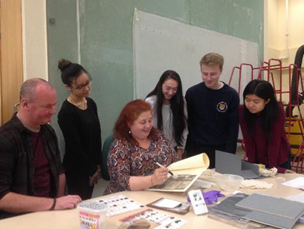
As the archive became better known, it started to generate public interest and led to a number of new donations, including personal and formerly private collections, priceless ECFC memorabilia such as a ball brought back from South America in 1914 by ECFC Hall of Fame player Dick Pym, a season ticket from the Club’s first season in the Football League (1920), and a winners medal from the 1934 Division Three South Cup, which to this day remains the only major cup win in the club’s 118 year history.
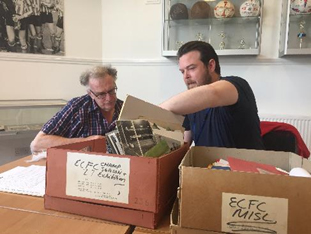
A separate award by the Arts and Humanities Research Council made it possible to employ world-leading football photographer and FIFA consultant Peter Robinson who photographed fans across the stadium in 2017. The Heritage Lottery Fund award allowed us to produce an exhibition of Peter’s high-quality images showing the stadium from a slightly different perspective, whilst also documenting the character and features of the stadium for future generations.
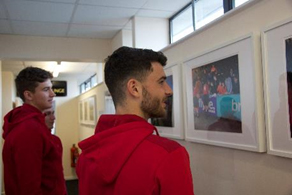
To engage a wide range of communities, a number of heritage gathering and celebration events were run, which allowed us to continue to collect memories associated with the heritage and to work to support well-being programmes in the local community, such as the Beacon Centre’s Meet and Remember Group.
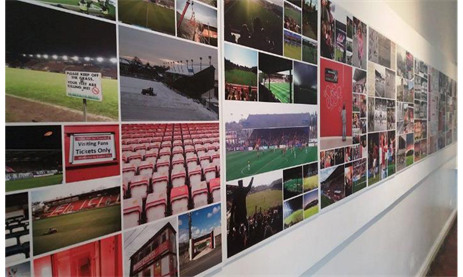
The Heritage Lottery Fund award also made it possible to crowdsource a number of images to celebrate the lives of fans and volunteers at the club. Our fast-expanding collection, interest in the Peter Robinson exhibition, and the success of the crowdsourcing exercise inspired us to bid for a second Heritage Lottery Fund project, ‘The City Museum’ (2017-18), aimed at creating a stadium-wide approach to the celebration of heritage at St James Park.
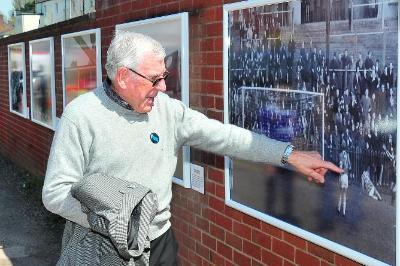
This second award allowed us to work towards museum accreditation and export some of the digital exhibits from the Grecian Archive to the prestigious Europeana portal. It also allowed us to celebrate the history of the Club through a series of exhibitions such as the outdoor Fans Through the Ages exhibition, which allows fans and players to identify themselves in the images to their friends and families.
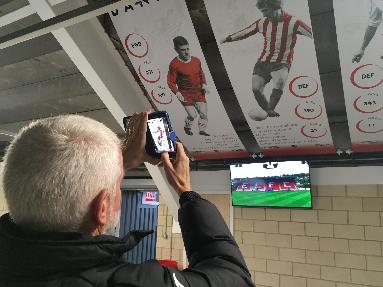
The redevelopment of the Old Grandstand also led to a number of historic objects being found and to the inclusion in the new Stagecoach Adam Stansfield Stand of a Hall of Fame exhibition that celebrates key individuals in the history of the Club.
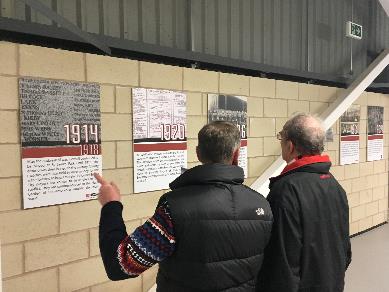
The same stand also showcases a chronology illustrating key moments in the history of the Club and Trust through a series of displays that use digitised images from the Grecian Archive to illustrate the story.
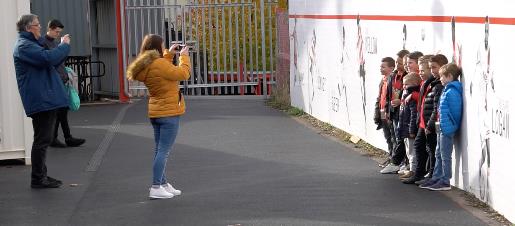
Just outside the stand is now the home of the Walk of Fame Strikers Mural, which was designed by graphic designer and volunteer Ed Barrett, and offers photo opportunities on match days to past and current players, fans and mascots. The wall also uses information gathered for the Grecian Archives A-Z collection to acknowledge all known players to have played for the first team between 1904 and 2018.
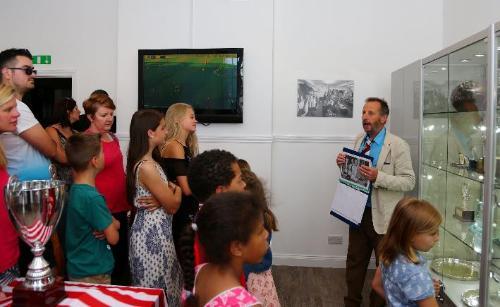
Finally, a Museum Display Room was created in order to display our most valued items and research collections and also to provide workshops for the museum team to deliver our key heritage aims. The room is also used during match days for hospitality and forms part of the stadium tours that are attracting the attention of new generations of Grecian fans. It is in this room that a pilot workshop with the Football Supporters Association was held in 2019 to test the benefits of rolling out a series of national workshops to help other clubs to turn their cupboards into wonderful museums spaces.
Thanks to this programme we were in the very lucky position to receive one further award by the Heritage Lottery Fund in 2019, with the aim to develop a best practice film and framework, create two exhibitions, one using images from the local paper, the Express and Echo, the other celebrating well known players and managers from competing teams who came to Exeter at the Away End, and finally an exhibition and film celebrating diversity in football and showcasing our LGBT communities.
Acknowledgements
This work would not have been possible without the generous support of the Heritage Lottery Fund and all the volunteers and donors who have helped to make our dream come true.
Biographies
Gabriella Giannachi
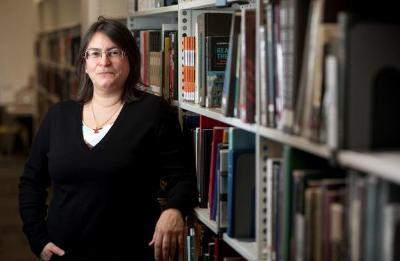
Gabriella Giannachi is Professor in Performance and New Media at the University of Exeter. She has published a number of books including: Virtual Theatres (2004); The Politics of New Media Theatre (2007); Performing Presence: Between the Live and the Simulated, co-authored with Nick Kaye (2011); Performing Mixed Reality, co-authored with Steve Benford (2011); Archaeologies of Presence, co-edited with Michael Shanks and Nick Kaye; Archive Everything (2016) and Histories of Performance Documentation, co-edited with Jonah Westerman (2018). She has written papers for a number of humanities and science journals, and has been involved in a number of AHRC and RCUK funded projects in collaboration with the Royal Albert Memorial Museum and Art Gallery, The Science Museum, the Natural History Museum, and Tate, including the Performance at Tate (2014-16) and the Documenting Digital Art (2019-21) projects.
Will Barrett
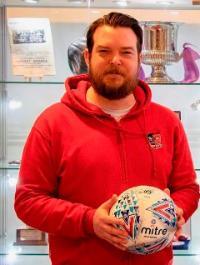
Dr Will Barrett graduated with his PhD in English from the University of Exeter in 2019, having researched the evolution of the museum, and use of mobile technology in the cultural heritage sector, to create and evaluate a framework for engagement with digital heritage in everyday environments outside of the traditional museum space. As the project coordinator for three consecutive National Lottery Heritage Funded projects at St James Park, he has taken a direct role in the development of the ECFC Museum, utilising collections to create both digital and tangible displays that illustrate and celebrate the history and heritage of Exeter City Football Club. Alongside Professor Gabriella Giannachi and colleagues from the University of Exeter and the ECFC Supporters’ Trust, Will is a co-founder of the Grecian Archive, which displays over 5,000 items, collections, exhibits, and co-curated narratives to tell the constantly evolving story of the Devon based football club.
Paul Farley

Paul Farley is a Devon boy, born and bred, and grew up with City in his blood. His father was a season ticket holder until he died, aged 91, in 2014. Paul has been a member of the Trust since the dark times of 2003 when he became a volunteer, spending much of that summer weeding, painting and working alongside many others to get the club to be able to play in the Conference. He has been a volunteer ever since. Paul was first elected to the Trust Board in 2010 and currently leads its Community Group, which is responsible for delivering the Trust’s aspiration of being ‘no ordinary football club’. He is helping to create and develop the Former Players Association. Paul was a founding Trustee of the Exeter City Football Club Museum Charity and is the Charity’s first Chair.
Martin Weiler
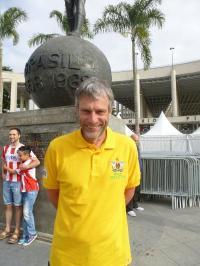
Brought up in London watching Hounslow Town, Brentford and Spurs, Martin studied History and Archaeology at the University of Exeter and stayed on to live and work in the Devon city. This led to following Exeter City and increasingly getting involved as the Supporters Trust became owners in 2003. Martin is a member of the Trust Board and in 2016/7 was Trust Chair and a Club Director. He is also a Trustee of the Club’s charity, the City Community Trust. Martin is Secretary of the Exeter City History Group and a Trustee of the new Exeter City Football Club Museum Trust. Martin is also particularly interested in the history of stadiums and has visited all ‘the 92’.


/prod01/wlvacuk/media/departments/digital-content-and-communications/images-2024/240328-Varsity-Line-Up-Resized.jpg)
/prod01/wlvacuk/media/departments/digital-content-and-communications/images-18-19/220325-Engineers_teach_thumbail.jpg)
/prod01/wlvacuk/media/departments/digital-content-and-communications/images-2024/240515-Spencer-Jones-Award-Resized.jpg)
/prod01/wlvacuk/media/departments/digital-content-and-communications/images-2024/240320-Uzbekistan-Resized.jpg)
/prod01/wlvacuk/media/departments/digital-content-and-communications/images-2024/240229-The-Link-Resized.jpg)
/prod01/wlvacuk/media/departments/digital-content-and-communications/images-2024/240516-Andy-Gibson-Resized.jpg)